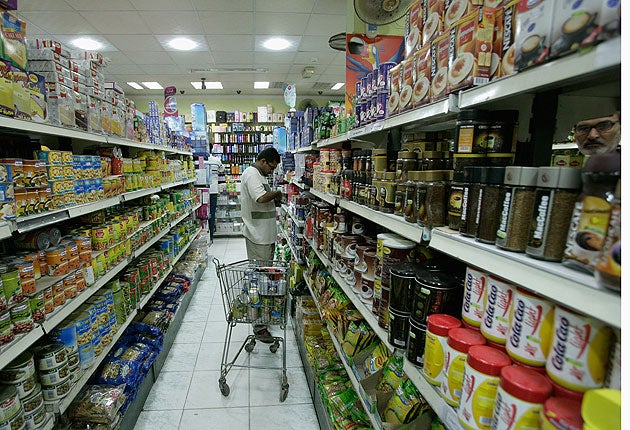Pay packaging recycling costs, stores told

Your support helps us to tell the story
From reproductive rights to climate change to Big Tech, The Independent is on the ground when the story is developing. Whether it's investigating the financials of Elon Musk's pro-Trump PAC or producing our latest documentary, 'The A Word', which shines a light on the American women fighting for reproductive rights, we know how important it is to parse out the facts from the messaging.
At such a critical moment in US history, we need reporters on the ground. Your donation allows us to keep sending journalists to speak to both sides of the story.
The Independent is trusted by Americans across the entire political spectrum. And unlike many other quality news outlets, we choose not to lock Americans out of our reporting and analysis with paywalls. We believe quality journalism should be available to everyone, paid for by those who can afford it.
Your support makes all the difference.A report which says supermarkets are using excessive food packaging and should contribute towards the cost of dealing with it was branded "nonsense" and "naive" by the industry today.
The study by the Local Government Association (LGA) said people's efforts to recycle rubbish were being undermined by the stores they shopped in.
It showed that although the weight of supermarket food packaging had gone down over the past two years, almost 40 per cent of it still could not be easily recycled.
But the British Retail Consortium (BRC) said the survey failed to acknowledge the key role packaging played in preserving food and thereby reducing waste.
Its head of environment, Bob Gordon, said: "It's a nonsense to suggest that retailers swathe their goods in masses of unnecessary packaging. This would simply be a pointless cost. Packaging reduces waste by protecting and preserving products."
Jane Bickerstaffe, director of the Industry Council for Packaging and the Environment, added: "The report is naive and shows a singular lack of knowledge of the modern supply chain and what it takes to feed a nation of 60 million.
"Products have different supply chains and different amounts of transport packaging. Some products have a short shelf life, others are made to last longer. The amount of packaging has to reflect this."
The LGA report argues that supermarkets should contribute towards the cost of recycling and waste disposal services so they are encouraged to produce less packaging in general.
As well as making recycling easier and more affordable this would also ease the burden of landfill tax on local government, it says.
Landfill tax costs councils £32 for every tonne of rubbish they throw away - a figure that will rise to £48 a tonne by 2010 - meaning that by 2011 an estimated £1.8 billion will have been spent on it since 2008.
LGA chairman Cllr Margaret Eaton said: "Britain is the dustbin of Europe with more rubbish being thrown into landfill than almost any other country in Europe.
"Taxpayers don't want to see their money going towards paying landfill taxes and EU fines when council tax could be reduced instead.
"At a time when we're in recession and shoppers are feeling the pinch, we have to move on from a world that tolerates cling filmed coconuts and shrink wrapped tins of baked beans. Families are fed up with having to carry so much packaging home from the supermarket."
She added: "If we had less unnecessary packaging it would cut costs and lead to lower prices at the tills. When packaging is sent to landfill, it's expensive for taxpayers and damaging for the environment.
"Supermarkets need to up their game so it's easier for people to do their bit to help the environment. If retailers create unnecessary rubbish, they should help taxpayers by paying for it to be recycled."
The British Market Research Bureau (BMRB) was commissioned by the LGA to look at eight supermarkets and the type and weight of food packaging they used in a typical shopping basket.
The survey found Sainsbury's had the highest level of packaging that could be easily recycled (67 per cent) while Lidl had the lowest (58 per cent).
Waitrose had the heaviest packaging and Tesco had the lightest. The LGA said since its first survey in October 2007 the weight of food packaging had been reduced overall but the proportion that could be recycled had changed little.
The British Retail Consortium's Mr Gordon said: "Retailers pay over £5 billion a year in business rates towards local authority funding. The biggest barrier to recycling is local authorities' failure to agree on which materials they're prepared to recycle."
A Waitrose spokeswoman added: "Waitrose has cut product packaging weight by over a third since 2001.
"We were disappointed the LGA did not allow us to see a copy of the Report or provide us with a right to reply to the claims before it was issued.
"We are currently going through the report and believe it to be misleading. It fails to use accurate comparisons - a 500g tomato punnet at Waitrose is compared to a 250g punnet at most other stores. An accurate way to assess packaging would be by comparing per 100g of a product."
Join our commenting forum
Join thought-provoking conversations, follow other Independent readers and see their replies
Comments